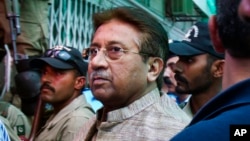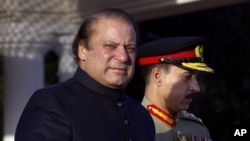Pakistan Prime Minister Nawaz Sharif says he is bound under the country’s constitution to put former military ruler Pervez Musharraf on trial for high treason. Critics fear the move could set up a clash between Sharif and the powerful military.
Former military leader Pervez Musharraf overthrew Sharif in a bloodless coup during Sharif's earlier stint as prime minister in 1999. Musharraf, who went on to rule Pakistan for nearly a decade, is currently under house arrest in Islamabad, with a number of legal challenges pending against him related to his time in power.
The Supreme Court and parliament at the time validated the military coup, which had widespread public support. But the top court later outlawed the moves Musharraf made in November 2007 to suspend the constitution and impose a state of emergency in a bid to prolong his rule.
Prime Minister Sharif on Monday told the parliament his government fully agrees with the top court's ruling that Musharraf’s decisions constituted an act of high treason, and said he should be tried under Article 6 of Pakistan’s constitution.
“The prime minister is under oath to protect, preserve and defend the constitution and it is implicit in his oath that his government ensures that persons guilty of acts under Article 6 are brought to justice,” he said.
Prime Minister Sharif said that Musharraf will have to answer for his guilt before the court.
“The federal government will proceed in accordance with the law and also take political forces into confidence through a consultative process so that the collective will and wisdom of the people of Pakistan is duly reflected in further process in this behalf,” he said.
The Pakistani constitution allows only the federal government to initiate a treason trial, but the previous coalition government refused to do so, apparently fearing a military backlash.
Pakistan has experienced three coups that allowed the military to rule the country for nearly half of its existence since becoming an independent nation in 1947. Musharraf would be the first army ruler tried for treason and he could be sentenced to death or life in prison if convicted. However, many critics doubt the military, which is still considered Pakistan’s most powerful institution, would allow that to happen.
Musharraf’s lawyers have dismissed Prime Minister Sharif’s move as politically motivated. They say it is designed to distract attention from more pressing national issues, like a badly ailing economy, unemployment, the country's worsening security situation and a deepening national energy crisis.
Former military leader Pervez Musharraf overthrew Sharif in a bloodless coup during Sharif's earlier stint as prime minister in 1999. Musharraf, who went on to rule Pakistan for nearly a decade, is currently under house arrest in Islamabad, with a number of legal challenges pending against him related to his time in power.
The Supreme Court and parliament at the time validated the military coup, which had widespread public support. But the top court later outlawed the moves Musharraf made in November 2007 to suspend the constitution and impose a state of emergency in a bid to prolong his rule.
Prime Minister Sharif on Monday told the parliament his government fully agrees with the top court's ruling that Musharraf’s decisions constituted an act of high treason, and said he should be tried under Article 6 of Pakistan’s constitution.
“The prime minister is under oath to protect, preserve and defend the constitution and it is implicit in his oath that his government ensures that persons guilty of acts under Article 6 are brought to justice,” he said.
Prime Minister Sharif said that Musharraf will have to answer for his guilt before the court.
“The federal government will proceed in accordance with the law and also take political forces into confidence through a consultative process so that the collective will and wisdom of the people of Pakistan is duly reflected in further process in this behalf,” he said.
The Pakistani constitution allows only the federal government to initiate a treason trial, but the previous coalition government refused to do so, apparently fearing a military backlash.
Pakistan has experienced three coups that allowed the military to rule the country for nearly half of its existence since becoming an independent nation in 1947. Musharraf would be the first army ruler tried for treason and he could be sentenced to death or life in prison if convicted. However, many critics doubt the military, which is still considered Pakistan’s most powerful institution, would allow that to happen.
Musharraf’s lawyers have dismissed Prime Minister Sharif’s move as politically motivated. They say it is designed to distract attention from more pressing national issues, like a badly ailing economy, unemployment, the country's worsening security situation and a deepening national energy crisis.





